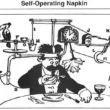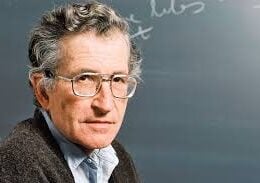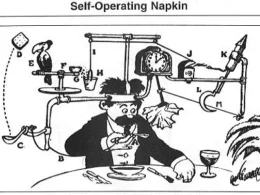I am not going to opine on the particulars of the President Obama’s Iran deal (“Joint Plan of Action”), other than to say that many years ago I spent time in Iran, loved the people and came to think that they are the USA’s natural allies in that part of the world’s (just as in my travels I came to believe that Vietnam is our natural ally in continental Asia), but had a beef with the authoritarianism of most of the mullahs I met (a dissatisfaction that I had opportunity to express to them while there). I am a liberal (not in the modern American misuse of the term, but in the correct, Hayekian/Milton Friedman sense of the term), and to me non-liberals generally seem like sociopaths. So while analysis of the terms of JPOA that I might venture would come from that mixed sense of a belief that American engagement with Persia would be good for the world, while standing up for America’s liberal values (and for those countries that broadly share them, such as Israel) is also good for the world, I will leave that for another place and time. Instead, this comment on the JPOA will be based not on its substance, but on the process which gave birth to it: In my experience, when any one person (including myself) believes that one’s greater wisdom, virtue, or intelligence puts one in a position to bypass institutions which have evolved (such as common law) or which have withstood the test of time (such as the US Constitution), it generally works out badly.
With that in mind, I would would like to excerpt from Federalist Paper #75, “The Treaty-Making power of the Executive” (Alexander Hamilton, emphases added):
“With regard to the intermixture of powers, I shall rely upon the explanations already given in other places, of the true sense of the rule upon which that objection is founded; and shall take it for granted, as an inference from them, that the union of the Executive with the Senate, in the article of treaties, is no infringement of that rule. I venture to add, that the particular nature of the power of making treaties indicates a peculiar propriety in that union. Though several writers on the subject of government place that power in the class of executive authorities, yet this is evidently an arbitrary disposition; for if we attend carefully to its operation, it will be found to partake more of the legislative than of the executive character, though it does not seem strictly to fall within the definition of either of them. The essence of the legislative authority is to enact laws, or, in other words, to prescribe rules for the regulation of the society; while the execution of the laws, and the employment of the common strength, either for this purpose or for the common defense, seem to comprise all the functions of the executive magistrate. The power of making treaties is, plainly, neither the one nor the other. It relates neither to the execution of the subsisting laws, nor to the enaction of new ones; and still less to an exertion of the common strength. Its objects are CONTRACTS with foreign nations, which have the force of law, but derive it from the obligations of good faith. They are not rules prescribed by the sovereign to the subject, but agreements between sovereign and sovereign. The power in question seems therefore to form a distinct department, and to belong, properly, neither to the legislative nor to the executive. The qualities elsewhere detailed as indispensable in the management of foreign negotiations, point out the Executive as the most fit agent in those transactions; while the vast importance of the trust, and the operation of treaties as laws, plead strongly for the participation of the whole or a portion of the legislative body in the office of making them.
“However proper or safe it may be in governments where the executive magistrate is an hereditary monarch, to commit to him the entire power of making treaties, it would be utterly unsafe and improper to intrust that power to an elective magistrate of four years’ duration. It has been remarked, upon another occasion, and the remark is unquestionably just, that an hereditary monarch, though often the oppressor of his people, has personally too much stake in the government to be in any material danger of being corrupted by foreign powers. But a man raised from the station of a private citizen to the rank of chief magistrate, possessed of a moderate or slender fortune, and looking forward to a period not very remote when he may probably be obliged to return to the station from which he was taken, might sometimes be under temptations to sacrifice his duty to his interest, which it would require superlative virtue to withstand. An avaricious man might be tempted to betray the interests of the state to the acquisition of wealth. An ambitious man might make his own aggrandizement, by the aid of a foreign power, the price of his treachery to his constituents. The history of human conduct does not warrant that exalted opinion of human virtue which would make it wise in a nation to commit interests of so delicate and momentous a kind, as those which concern its intercourse with the rest of the world, to the sole disposal of a magistrate created and circumstanced as would be a President of the United States.”








Where are all the commenters? Is comment disallowed here?
OK. Ir posted … this time.
My criticism of Hamilton did NOT post. I regard him as a Rothschild agent that only elitists would be attracted to. He paved the way for our current economic difficulties by designing a monetary system that could be meddled with. I see nothing wrong with using the exchange mediums of other countries, as we did back then, as long as the content was verifiable. We no longer even have exchange mediums where content is worthy of consideration (paper).
To paraphrase the warden in Cool Hand Luke, “what we have here is conundrum.” On the one hand,we have a written Constitution including, thankfully, amendments in the nature of a Bill of Rights, which seems to have served us well for a considerable period and likely provides a better foundation for government than no fundamental law at all. On the other hand, we have a Congress established under that Constitution which in many respects dishonors and violates the same Constitution under which it exists.
For example, the House of Representatives is well known for having adopted over 2,000 pages of laws taking control of human access to medical care without first reading it, upon reasoning by its Speaker that “we must first pass the bill in order to find out what is in it.” We have a Senate and House whose members frequently sign an oath of allegiance to a foreign government before taking their elected seat. In such circumstances, what is a president to do when the interests of the people are best served by negotiating a peaceful resolution of differences with a foreign sovereign?
It seems to me the better approach is to abide by the Constitution in all respects. Only by that approach will the design of the Founders have its best chance of success in advancing national interests.
As to whether Hamilton was a Rothschild agent, I am persuaded that, more likely, Burr was. But the question before us is whether the analysis Hamilton expressed in Federalist #75 is valid or flawed. I don’t find the flaw in it. However, I believe it presumes that all provisions of the Constitution are obeyed and enforced uniformly.
U.S. Attorney Aims to Dismiss Insider Trading Charges in SAC Capital Advisors Case
Moves follows appeals court ruling that prosecutors stretched the limits of the law
By Christopher M. Matthews and Aruna Viswanatha
Updated Oct. 22, 2015 8:24 p.m. ET
wsj.com
Manhattan U.S. Attorney Preet Bharara will drop charges against seven people, dealing a blow to what had been one of the most successful insider-trading prosecutions and a marquee case in his tenure.
Not long ago, Mr. Bharara boasted a near-perfect conviction rate in the dozens of insider-trading cases pursued by his office. But on Thursday he moved to dismiss charges against former SAC Capital Advisors LP portfolio manager Michael Steinberg and six analysts.
Mr. Steinberg’s conviction stood out, because it brought prosecutors as close as they ever got to SAC founder Steven A. Cohen, the billionaire founder of the hedge fund, which prosecutors had been investigating for a decade hoping to prove it had relied on illegal insider tips to boost its trading results. Mr. Steinberg was a senior employee at the firm and a confidant of Mr. Cohen’s. Prosecutors have never accused Mr. Cohen of any wrongdoing.
None of the defendants have been sentenced and all have remained free on bail since their convictions. A federal judge will need to approve Mr. Bharara’s decision to dismiss the charges.
“Michael Steinberg did not commit any crime and is an innocent man,” said Barry Berke, the lawyer for Mr. Steinberg. “We hope that his vindication will receive as much attention as his wrongful prosecution.”
The prosecutions were pursued in good faith, Mr. Bharara said in a short statement, but he had come to believe that “insisting on maintaining guilty pleas in these cases wouldn’t be in the interests of justice.” He cited an appeals- court ruling last year that found prosecutors had stretched the limits of insider- trading law and that effectively undermined the legal foundations of those cases.
Mr. Bharara built his reputation as Wall Street’s toughest cop with the yearslong crackdown on insider trading that produced more than 80 convictions and only one acquittal. The move to drop the cases won’t affect the insider-trading convictions of six other former SAC employees or the 2014 guilty plea by the firm itself.
But it is the latest blow to the long-running insider-trading push and undermines key allegations in its most-high profile investigation—the probe into SAC Capital, which has rebranded itself as Point72 Asset Management LP.
In late 2013, a jury convicted Mr. Steinberg. The trades at the heart of Mr. Steinberg’s case were among those cited in a civil lawsuit brought by the Securities and Exchange Commission against Mr. Cohen. The SEC has accused him of failing to supervise traders at his firm, including Mr. Steinberg.
In 2014, SAC agreed to plead guilty to securities fraud and wire fraud and pay a $1.8 billion penalty, a rare instance of a hedge fund being criminally charged for insider trading. In its plea, it took responsibility for the actions of Mr. Steinberg and a handful of other employees. The firm was also barred from managing outside money and now manages Mr. Cohen’s personal fortune.
Legal experts said Mr. Bharara’s move Thursday could force the SEC to revise its case against Mr. Cohen but was unlikely to force the SEC to drop it since the case covered additional conduct.
Prosecutors on Thursday said they would also drop their case against another SAC employee, former analyst Jon Horvath, who pleaded guilty and testified against Mr. Steinberg at trial.
Mark Herr, a spokesman for Point72, said the group was “pleased that the ordeal for Mike Steinberg and his family is over.”
The five other analysts who prosecutors will drop their cases against— Jesse Tortora, Spyridion Adondakis, Sandeep Goyal, Danny Kuo and Hyung G. Lim—all had pleaded guilty to insider trading and cooperated with the government. None worked at SAC. Lawyers for four of them said they were pleased with Mr. Bharara’s decision, and the others didn’t respond to requests for comment. A lawyer for Mr. Kuo said he believed the SEC would drop a related case against him.
In some respects, Mr. Bharara was left with little choice but to drop the cases following last year’s ruling by the Second U.S. Circuit Court of Appeals in New York that overturned the insider-trading convictions of two hedge-fund portfolio managers.
In the ruling, the court said it wasn’t enough for prosecutors to show that someone who received an inside tip traded on material nonpublic information about a corporation. Unless there is a “meaningfully close personal relationship” between the tipper and tippee, prosecutors had to prove that a person trading on the confidential information knew that it came from somebody who stood to be substantially rewarded in exchange, according to the Second Circuit opinion.
Mr. Bharara has assailed the ruling and said it would hamper prosecutors’ pursuit of insider trading. He said the stricter evidence standards set by the Second Circuit were a “potential bonanza for friends and family of rich people with access to material nonpublic information.”
The Justice Department asked the U.S. Supreme Court to review the ruling, a request the high court denied earlier in October, effectively leaving the ruling as the law of the land.
Legal experts had expected that the developments would have an impact on the conviction of Mr. Steinberg and a handful of other cases.
Joon Kim, Mr. Bharara’s top deputy, said Thursday’s move would be “largely the extent of the fallout” on the office’s prior insider trading cases.
Prosecutors accused Mr. Steinberg of using inside information about technology companies Dell Inc. and Nvidia Corp. to make lucrative trades. Jurors during the trial heard testimony from the government’s star witness, Mr. Horvath, who pleaded guilty in 2012 to charges he obtained confidential Dell and Nvidia tips. But he was the only government witness to directly connect Mr. Steinberg to the alleged inside information, which came through a chain of analysts and traders.
By agreeing to dismiss the charges Thursday, prosecutors are conceding they cannot prove Messrs. Steinberg or Horvath knew that the original source of the tip had received some sort of improper benefit for disclosing the information.
The SEC case against Mr. Cohen has been delayed as the SEC and Justice Department awaited the Supreme Court to review the Second Circuit’s decision. The civil case by the SEC faces a lower burden of proof than do criminal insider-trading cases.
—Juliet Chung contributed to this article
Write to Christopher M. Matthews at [email protected] and Aruna Viswanatha at [email protected]
wsj.com
money changers need to spend to find out who hacks email & etc,
The Second Circuit court’s ruling made insider trading nearly impossible to prosecute.
There will be a window to rewrite law or regulation when next the financial system pops the duct tape holding it together, but law or regulation IS just more duct tape.
IMO we should be preparing for that momen by engineering an inherently secure network that will scale for anticipated future data flows.
Damon Runyon said everything in life is 6 to 5 against.
This is really good post i will link this guide to my blog, keep posting!